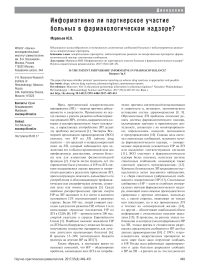Информативно ли партнерское участие больных в фармакологическом надзоре?
Автор: Муравьев Ю.В.
Журнал: Научно-практическая ревматология @journal-rsp
Рубрика: Дискуссия
Статья в выпуске: 4 т.55, 2017 года.
Бесплатный доступ
Обсуждается целесообразность и возможность спонтанных сообщений больных о неблагоприятных реакциях на лекарственные препараты.
Лекарственные препараты, неблагоприятные реакции на лекарственные препараты, фармакологический надзор, спонтанные сообщения
Короткий адрес: https://sciup.org/14945846
IDR: 14945846 | DOI: 10.14412/1995-4484-2017-449-451
Список литературы Информативно ли партнерское участие больных в фармакологическом надзоре?
- Wooten JM. Adverse drug reactions: part I. South Med J. 2010;103(10):1025-8 DOI: 10.1097/SMJ.0b013e3181f0c866
- WHO Technical Report. 1972;498.
- Edwards IR, Aronson JK. Adverse drug reactions: definitions, diagnosis and management. Lancet. 2000;356:1255-9 DOI: 10.1016/S0140-6736(00)02799-9
- Lazarou J, Pomeranz BH, Corey PN. Incidence of adverse drug reactions in hospitalized patients: a meta-analysis of prospective studies. JAMA. 1998;279(15):1200-5 DOI: 10.1001/jama.279.15.1200
- Watson R. New EU drug safety committee ends national reporting of drug reactions. BMJ. 2012;345:e4690 DOI: 10.1136/bmj.e4690
- Kongkaew C, Noyce PR, Ashcroft DM. Hospital admissions associated with adverse drug reactions: a systematic review of prospective observational studies. Ann Pharmacother. 2008;42(7):1017-25 DOI: 10.1345/aph.1L037
- Bordet R, Gautier S, Le Louet H, et al. Analysis of the direct cost of adverse drug reactions in hospitalized patients. Eur J Clin Pharmacol. 2001;56(12):935-41 DOI: 10.1007/s002280000260
- Bates DW, Cullen DJ, Laird N, et al. Incidence of adverse drug events and potential adverse drug events. Implications for prevention. ADE Prevention Study Group. JAMA. 1995;274(1):29-34 DOI: 10.1001/jama.1995.03530010043033
- Oshikoya KA, Awobusuyi JO. Perceptions of doctors to adverse drug reaction reporting in a teaching hospital in Lagos, Nigeria. BMC Clin Pharmacol. 2009;9:14 DOI: 10.1186/1472-6904-9-14
- Aagaard L, Nielsen LH, Hansen EH. Consumer reporting of adverse drug reactions: a retrospective analysis of the Danish adverse drug reaction database from 2004 to 2006. Drug Saf. 2009;32(11):1067-74 DOI: 10.2165/11316680-000000000-00000
- Van Puijenbroek E, Diemont W, van Grootheest K. Application of quantitative signal detection in the Dutch spontaneous reporting system for adverse drug reactions. Drug Saf. 2003;26(5):293-301 DOI: 10.2165/00002018-200326050-00001
- Stricker BH, Psaty BM. Detection, verification, and quantification of adverse drug reactions. BMJ. 2004;329(7456):44-7 DOI: 10.1136/bmj.329.7456.44
- Sharrar RG, Dieck GS. Monitoring product safety in the postmarketing environment. Ther Adv Drug Saf. 2013;4(5):211-9 DOI: 10.1177/2042098613490780
- Herdeiro MT, Figueiras A, Polonia J, Gestal-Otero J. Influence of pharmacists' attitudes on adverse drug reaction reporting. Drug Saf. 2006;29(4):331-40 DOI: 10.2165/00002018-200629040-00004
- Olsson S. The role of the WHO programme on International Drug Monitoring in coordinating worldwide Drug Safety efforts. Drug Saf. 1998;19:1-10 DOI: 10.2165/00002018-199819010-00001
- Hazell L, Shakir SA. Under-reporting of adverse drug reactions: a systematic review. Drug Saf. 2006,29:385-96 DOI: 10.2165/00002018-200629050-00003
- Biagi C, Montanaro N, Buccellato E, et al. Underreporting in pharmacovigilance: an intervention for Italian GPs (Emilia-Romagna region). Eur J Clin Pharmacol. 2013;69(2):237-44 DOI: 10.1007/s00228-012-1321-7
- Alvarez-Requejo A, Carvajal A, Begaud B, et al. Under-reporting of adverse drug reactions. Estimate based on a spontaneous reporting scheme and a sentinel system. Eur J Clin Pharmacol. 1998,54:483-8 DOI: 10.1007/s002280050498
- Meyboom RH, Egberts AC, Gribnau FW, Hekster YA. Pharmacovigilance in perspective. Drug Safety. 1999;21(6):429-47 DOI: 10.2165/00002018-199921060-00001
- Inman WH. Attitudes to adverse drug reaction reporting. Br J Clin Pharmacol. 1996;41:434-5.
- Backstrom M, Mjorndal T, Dahlqvist R. Under-reporting of serious adverse drug reactions in Sweden. Pharmacoepidemiol Drug Saf. 2004;13:483-7 DOI: 10.1002/pds.962
- Herxheimer A, Crombag R, Alves TL. Patients reported adverse drug reactions: what's happening in Europe. Assist Inferm Ric. 2011;30(1):42-7.
- Mitchell AS, Henry DA, Sanson-Fisher R, O'Connell DL. Patients as a direct source of information on adverse drug reactions. BMJ (Clinical research ed). 1988;297(6653):891-3 DOI: 10.1136/bmj.297.6653.891
- Hazell L, Cornelius V, Hannaford P, et al. How do patients contribute to signal detection? A retrospective analysis of spontaneous reporting of adverse drug reactions in the UK's Yellow Card Scheme. Drug Saf. 2013;36(3):199-206 DOI: 10.1007/s40264-013-0021-2
- Blenkinsopp A, Wilkie P, Wang M, Routledge PA. Patient reporting of suspected adverse drug reactions: a review of published literature and international experience. Br J Clin Pharmacol. 2006;63:148-56 DOI: 10.1111/j.1365-2125.2006.02746.x
- Van Grootheest K, de Graafde L, de Jong-van den Berg LT. Consumer adverse drug reaction reporting: a new step in pharma-covigilance? Drug Saf Int J Med Toxicol Drug Exp. 2003;26(4):211-7 DOI: 10.2165/00002018-200326040-00001
- Aagaard L, Hansen EH. Consumers' reports of suspected adverse drug reactions volunteered to a consumer magazine. Br J Clin Pharmacol. 2010;69(3):317-8 DOI: 10.1111/j.1365-2125.2009.03584.x
- Aronson J. Risk perception in drug therapy. Br J Clin Pharmacol. 2006;62(2):135-7 DOI: 10.1111/j.1365-2125.2006.02739_1.x
- Bongard V, Menard-Tache S, Bagheri H, et al. Perception of the risk of adverse drug reactions: ifferencesbetween health professionals and non health professionals. Br J Clin Pharmacol. 2002;54(4):433-06 DOI: 10.1046/j.1365-2125.2002.01674.x
- Matos C, van Hunsel F, Joaquim J. Are consumers ready to take part in the Pharmacovigilance System? -a Portuguese preliminary study concerning ADR reporting. Eur J Clin Pharmacol. 2015;71(7):883-90 DOI: 10.1007/s00228-015-1867-2
- World Health Organization website. http://apps.who.int/medi-cinedocs/fr/d/Jh1465e/4.html. Accessed 20 Sept 2013.
- Egberts TC, Smulders M, de Koning FH, et al. Can adverse drug reactions be detected earlier? A comparison of reports by patients and professionals. BMJ. 1996;313(7056):530-1 DOI: 10.1136/bmj.313.7056.530
- Van Hunsel F, Talsma A, van Puijenbroek E, et al. The proportion of patient reports of suspected ADRs to signal detection in the Netherlands: case-control study. Pharmacoepidemiol Drug Saf. 2011;20(3):286-91 DOI: 10.1002/pds.2092
- Van Hunsel F, Passier A, van Grootheest AC. Comparing patients' and healthcare professionals' ADR reports after media attention: the broadcast of a Dutch television programme about the benefits and risks of statins as an example. Br J Clin Pharmacol. 2009;67(5):558-64 DOI: 10.1111/j.1365-2125.2009.03400.x
- Inch J, Watson MC, Anakwe-Umeh S. Patient versus healthcare professional spontaneous adverse drug reaction reporting: a systematic review. Drug Saf. 2012;35(10):807-18 DOI: 10.1007/BF03261977
- Margraff F, Bertram D. Adverse drug reaction reporting by patients: an overview of fifty countries. Drug Saf. 2014 Jun;37(6):409-19 DOI: 10.1007/s40264-014-0162-y
Статья научная


